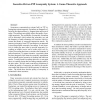1151 search results - page 64 / 231 » The role of game theory in human computation systems |
NIPS
2007
13 years 9 months ago
2007
Much of human knowledge is organized into sophisticated systems that are often called intuitive theories. We propose that intuitive theories are mentally represented in a logical ...
ATAL
2008
Springer
13 years 10 months ago
2008
Springer
Many multiagent domains where cooperation among agents is crucial to achieving a common goal can be modeled as coalitional games. However, in many of these domains, agents are une...
AIEDAM
2004
13 years 8 months ago
2004
Automated support of design teams, consisting of both human and automated systems, requires an understanding of the role of trust in distributed design processes. By explicitating ...
ICPP
2007
IEEE
14 years 2 months ago
2007
IEEE
– Anonymous communication systems built on P2P infrastructures using anonymity forwarders are frequently affected by the churn problem, i.e. frequent joins and leaves of nodes. T...
HCI
2009
13 years 5 months ago
2009
This paper will look at the human predisposition to oral tradition and its effectiveness as a learning tool to convey mission-critical information. After exploring the effectivenes...

